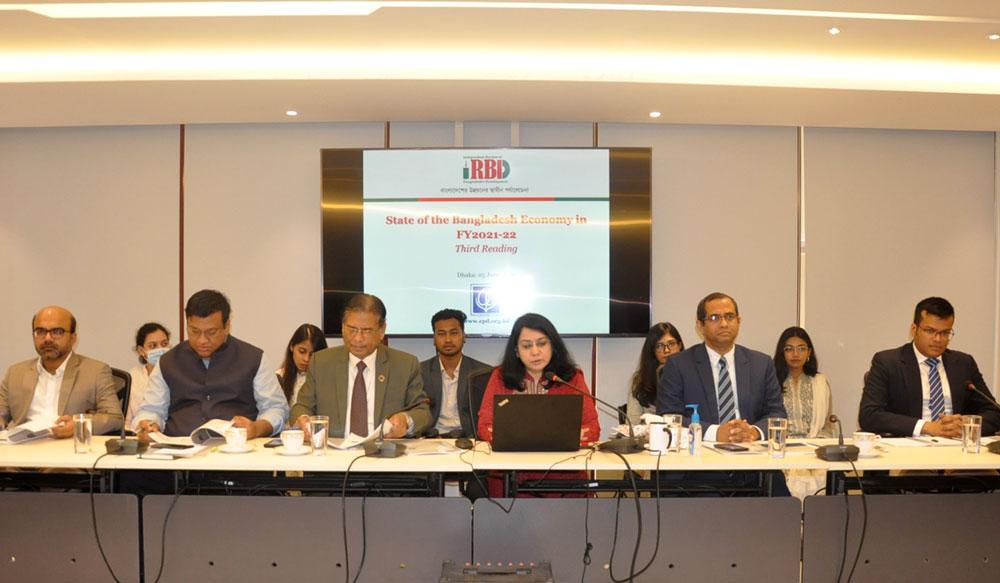
The Centre for Policy Dialogue (CPD) has undertaken the third interim review of Bangladesh’s macroeconomic performance for FY2021-22 as its long-standing tradition to carry out an interim review of the national economy towards the end of every fiscal year. The media briefing was organised under CPD’s flagship programme ‘Independent Review of Bangladesh’s Development (IRBD)’, and held on 5 June 2022 at the CPD premises.
Dr Fahmida Khatun, Executive Director of CPD made the keynote presentation at the media briefing on behalf of the research team. She said, while Bangladesh is about to graduate from the least developed country (LDC) status and become a middle-income country, its growth momentum is facing headwinds as a number of factors—including inflation, trade deficit, exchange rate volatility, pressure mounting on forex reserve—have exacerbated the pre-exiting challenges facing the country in recent times.
CPD feels that it is unfortunate that the gross domestic product (GDP) estimates have become the primary measure of the development of the country for many policymakers. In addition to that, the lack of real time data weakens realistic estimates of GDP, especially in the backdrop of COVID-19 pandemic. In view of the recovery of disadvantaged groups of the country from the impacts of the pandemic and the prevailing concerns as regards macroeconomic instability, it is high time to refocus the policy attention to protect the purchasing power of the low and limited income groups, maintain macroeconomic stability, and prioritise sustainable development targets beyond GDP growth.
In her presentation, Dr Fahmida then pointed out that the deflators used for estimating GDP figures also appear to be problematic. Following the trend of the first six months of FY2021–22, it has now become obvious that the annual targets of revenue mobilisation will not be attained. Tax revenue (26.7 per cent growth against the annual target of 28.2 per cent) collection has missed the target during the first half of FY2021–22. Data discrepancy makes the actual scenario difficult to gauge. Moreover, over the recent years, failure to collect income tax at the targeted level has been the key source of revenue shortfall. In addition, low value added tax (VAT) collection, at domestic level, has become a rising concern.
CPD opined that the struggle of the poor and low-income group that began with the outbreak of COVID-19 in early 2020 is now worsened by the unabated rise in the prices of essentials. The consumption basket used for calculating overall general inflation is outdated which does not reflect the current consumption pattern of consumers or the actual prices in the market in 2022. High inflation has revealed the inherent weakness in the government’s domestic resource mobilisation approach which is largely dependent on revenue collection from indirect taxes. Thus, fiscal policy which is highly dependent on indirect taxes propagates economic inequality in society and forces the government to trade-off revenue generation in the face of high inflation.
The presentation then showed that excess liquidity in the banking system has led to a fall in the interest rates, which were already quite low even prior to 2020. The negative real interest rate on bank deposits means that value of the savings of ordinary people was being depleted away during the pandemic and during high inflation—a time when they needed to utilise their savings the most.
While emphasising private sector investment, CPD stated that, despite stellar economic growth in the pre-pandemic years, private sector credit growth targets were not met in the recent years. Arguably, this weak private sector credit growth is an indication of low private sector investment.
The presentation showed that the gap between REER and NEER of Bangladesh was widening over the years which called for adjustment through depreciation of BDT. CPD had also argued in successive IRBD’s that Bangladesh’s exports were becoming less competitive vis-à-vis competitors and remittance flows were also being disincentivised because of this. While the gap between REER and NEER had been rising, the USD-BDT ‘Managed Float’ exchange rate did not go for necessary correction. Taka became appreciated as a consequence.
Considering the existing as well as emergent challenges, CPD recommended a number of measures. The presentation showed how it is urgent now to revisit and revise the minimum wages of workers in all industries immediately. Moreover, a new consumption basket should be formulated for calculating CPI inflation. CPD stressed the need of a higher salary increment in 2022 by the private sector corporations. Besides, the volume of sale of essential commodities through the open market system (OMS) should be increased, and distribution of these commodities must be managed effectively and without any corruption.
CPD emphasised that ensuring the quality, reliability and consistency of data of economic indicators will be the first step towards an effective outcome. Hence, policymakers will have to come out of growth obsession and focus on the quality of growth in terms of distribution of the benefits of growth more equally. Additionally, the policies should protect the purchasing power of the poor and low-income groups. CPD has been proposing various measures to ease the burden of rising prices and shrinking purchasing power of low- and fixed-income earning people including selectively reduce taxes at import and domestic stages and expanding social protection. Besides, strategic sectors such as energy and agriculture will have to be supported through subsidies for economic growth and food security. In the FY23 budget, fiscal measures pertaining to the external sector should focus on addressing the adverse impacts of imported inflation.
Professor Mustafizur Rahman, Distinguished Fellow, CPD; Dr Khondaker Golam Moazzem, Research Director, CPD and Mr Towfiqul Islam Khan, Senior Research Fellow, CPD were also present at the event and shared their views through responding to questions from the media.


